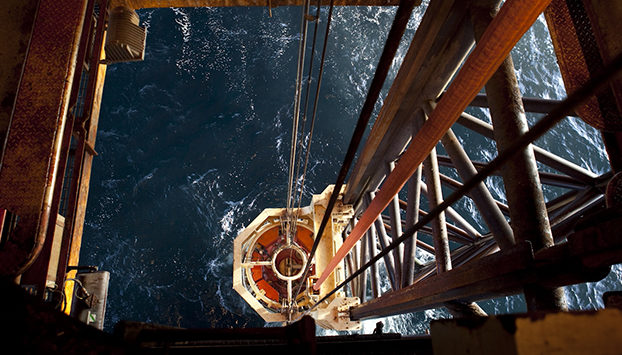
Global oil and gas exploration projects worth more than £95billion are likely to be put on hold next year as plunging oil prices render them uneconomic, new figures show.
The shelving of developments around the world could put a severe constraint on supplies by the end of the decade, it is feared.
As big oil fields that were discovered decades ago begin to deplete oil companies are trying to access more complex and hard-to-reach fields, which in some cases are deep under sea level.
At the same time, the cost of production has risen sharply because of the rising price of raw materials and the need for expensive new technology to reach the oil.
The outlook for onshore and offshore developments from the Barents Sea to the Gulf or Mexico now looks as uncertain as the price of oil, which has plunged by 40% in the past five months to below $70 a barrel.
According to Norwegian consultancy Rystad Energy, companies will make final investment decisions (FIDs) next year on a total of 800 oil and gas projects worth around £320billion and totalling nearly 60billion barrels of oil equivalent,
But with analysts forecasting oil to average $82.50 a barrel during 2015, Rystad said about one-third of the spending – or one-fifth of the volume – was unlikely to be approved.
“At $70 a barrel, half of the overall volumes are at risk,” Per Magnus Nysveen, head of analysis at the Oslo-based consultancy, added.
About one-third of the projects scheduled for FID in 2015 are so-called unconventional, where oil and gas are extracted using horizontal drilling in what is known as fracking, or mining.
Of those 20 billion barrels, around half are located in Canada’s oil sands and Venezuela’s tar sands, according to Mr Nysveen.
New oil fields typically require four to five years to be developed and billions before the first drop of oil is produced.
Any cutbacks in oil production bodes ill for international oil companies that are already struggling to replace depleting reserves as exploration becomes harder and discoveries smaller. It also points to tighter supplies by the end of the decade.
Chevron’s £6billion UK North Sea Rosebank project is among major projects thought to have a shaky future – a decision on whether it will go ahead is likely to be pushed back late into 2015 as the US-based company assesses its economics, analysts said.
Bertrand Hodee, research analyst at Paris-Based financial services group Raymond James, added: “This project was not deemed economic at $100 a barrel, so at current levels it is clearly a no-go.”
Rosebank, lying west of Shetland, is estimated to contain as much as 240million barrels of potentially recoverable oil equivalent.
The project is currently at the front-end engineering and design phase, Chevron said yesterday, adding: “The review of the economics and the additional engineering work is progressing. It is premature to make any statements on an FID date.”
Norway’s Statoil said earlier this week it had postponed until next October – a six-month delay – a decision to invest £3.7billion in the Snorre field in the Norwegian Sea as its profitability was under threat.
Royal Dutch Shell indicated in October that it was “less likely” to go ahead with unconventional projects in west Canada if oil falls below $80 a barrel.
Even in the Gulf of Mexico, one of the most attractive oil production areas in the world, projects are facing challenges.
Last year, BP put on hold a decision on its Mad Dog Phase 2 deepwater project in the Gulf after its development costs ballooned to nearly £13billion and the oil major is now expected to further delay an investment on the field’s development.
Statoil’s Johan Castberg field in the Barents Sea, which was expected to get its FID in 2015, is thought unlikely to get the go-ahead at the moment because of estimated project costs of up to £12billion.
Recommended for you
